| Srl | Item |
| 1 |
ID:
129754
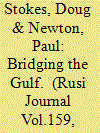

|
|
|
|
|
| Publication |
2014.
|
| Summary/Abstract |
Strategy is often about choices and those made in the 2015 Strategic Defence and Security Review will have significant implications for the future of UK defence and wider national security. The US has already made profound choices in this regard: it is rebalancing to East Asia. The implications for the UK, both as a US partner and a major European military power, include the possibility of deeper engagement with the Middle East and North Africa. Doug Stokes and Paul Newton examine the UK's nascent 'east of Suez' initiative, its key interests as well as the geopolitical drivers, dangers and opportunities involved. As the US seeks greater burden-sharing from its European allies, should the UK bridge the Gulf?
|
|
|
|
|
|
|
|
|
|
|
|
|
|
|
|
| 2 |
ID:
129756
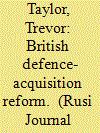

|
|
|
|
|
| Publication |
2014.
|
| Summary/Abstract |
Recent decisions regarding UK defence acquisition have attracted vocal criticism from many sides. Trevor Taylor reviews changes and progress made in recent years, and concludes that, while the complexities of the beast will never allow for perfection, the current system of defence acquisition can offer a good basis for improvement.
|
|
|
|
|
|
|
|
|
|
|
|
|
|
|
|
| 3 |
ID:
129784
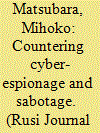

|
|
|
|
|
| Publication |
2014.
|
| Summary/Abstract |
Cyber-security is an increasing concern for both the UK and Japan, which have recently begun to co-operate more closely in this field as part of wider efforts to revitalise bilateral ties in foreign and security affairs. Mihoko Matsubara looks at this emerging partnership and explores the benefits and drawbacks of potential future joint initiatives, suggesting how the two countries can work together to mutual benefit.
|
|
|
|
|
|
|
|
|
|
|
|
|
|
|
|
| 4 |
ID:
129782
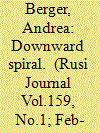

|
|
|
|
|
| Publication |
2014.
|
| Summary/Abstract |
North Korea's allergic reactions to US-South Korean military exercises continue to attract the world's attention and confusion. While Pyongyang condemns these regular drills as a veil for war preparations by Washington, the US and South Korea have for decades viewed them as essential for training, assurance and deterrence. Andrea Berger argues that, as a result, they have become a major thread in the complex web of security concerns and allied commitments that exist on the Korean Peninsula. Advances in the North Korean nuclear programme have made the situation surrounding joint exercises even more problematic, leaving a security dilemma that seems all but impossible to exit.
|
|
|
|
|
|
|
|
|
|
|
|
|
|
|
|
| 5 |
ID:
129781
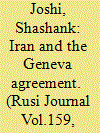

|
|
|
|
|
| Publication |
2014.
|
| Summary/Abstract |
The November 2013 agreement between Iran, the EU and six of the world's major powers is just the first of the diplomatic breakthroughs that will be needed to solve the longstanding nuclear dispute between the two sides. Indeed, the most challenging diplomacy - to move from an interim to a comprehensive and then to a 'final' deal - still lies ahead. Shashank Joshi analyses the terms of the Geneva Agreement before exploring the necessary conditions and likely stumbling blocks affecting any such future agreements at both the national and international levels.
|
|
|
|
|
|
|
|
|
|
|
|
|
|
|
|
| 6 |
ID:
129783


|
|
|
|
|
| Publication |
2014.
|
| Summary/Abstract |
South Korea's military has invested heavily in capabilities to counter the asymmetric threat posed by the North - and given Israel's recent success in this regard against Hamas, it is not surprising that South Korea is seeking to learn lessons from its ally's experience. However, Soon Ho Lee explains why the Israeli approach to counter-asymmetric warfare cannot be directly applied to a potential conflict on the Korean Peninsula, due to its likely scale and the limitations of contemporary technology, as well as North Korea's efforts to fortify strategic targets within its territory.
|
|
|
|
|
|
|
|
|
|
|
|
|
|
|
|
| 7 |
ID:
129785
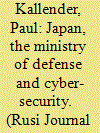

|
|
|
|
|
| Publication |
2014.
|
| Summary/Abstract |
Following a series of shocks that rocked Japan's confidence in its cyber-security provisions, in April 2014 the Japanese Ministry of Defense will finally set up a unified command to deal with cyber-security threats. However, many issues, including the role of Japan's military in the protection of critical national infrastructure and the nation's cyber-warfare doctrine, have yet to be finalised. Paul Kallender examines recent policy and posture changes by the Ministry of Defense as it tries to get to grips with new and changing cyber-security challenges.
|
|
|
|
|
|
|
|
|
|
|
|
|
|
|
|
| 8 |
ID:
129757


|
|
|
|
|
| Summary/Abstract |
With UK combat operations coming to an end in Afghanistan later this year, there will be a window of opportunity to review the hard-won lessons of the campaigns fought in the Middle East since 2001, and to consider the future evolution of counter-insurgency (COIN). Some might argue that it would be more prudent - and easier - simply to say 'never again'. Yet Alexander Alderson argues that insurgency is here to stay. As such, he explores seven challenges on which the UK should focus as it seeks to learn the difficult lessons of the COIN operations of the last decade.
|
|
|
|
|
|
|
|
|
|
|
|
|
|
|
|
| 9 |
ID:
129755
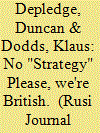

|
|
|
|
|
| Publication |
2014.
|
| Summary/Abstract |
The UK Arctic Policy Framework (APF) was published in October 2013. Following on from earlier examinations of the UK's growing interest in the Arctic, Duncan Depledge and Klaus Dodds explore how the country's engagement in the region has been evaluated within the context of energy, environment, science, defence and politics. They conclude with some questions regarding the monitoring and evaluation of the APF in both the short and longer term.
|
|
|
|
|
|
|
|
|
|
|
|
|
|
|
|
| 10 |
ID:
129780


|
|
|
|
|
| Publication |
2014.
|
| Summary/Abstract |
Since the First World War, veterans' charities have played an important role in the provision of health and welfare services for former military personnel and their families. With the recent Iraq and Afghanistan campaigns, the number of charities for veterans in the UK has grown rapidly, leading to concerns about quality, co-ordination of services and potential competition for public recognition and voluntary financial donations. This article uses data from the 2011 British Social Attitudes survey to measure levels of familiarity with veterans' charities amongst the British public; knowledge of individual veterans' charities; and purchases of poppies for the annual Poppy Appeal. On this basis, it suggests areas where veterans' charities may wish to improve public engagement and knowledge.
|
|
|
|
|
|
|
|
|
|
|
|
|
|
|
|
| 11 |
ID:
129748
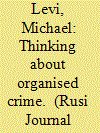

|
|
|
|
|
| Publication |
2014.
|
| Summary/Abstract |
The term 'organised crime' suggests a greater level of coherence than exists in reality, while the major threat imagery it evokes is useful for some purposes but counterproductive for others. While some organised criminal groups and activities pose a threat to national security, most affect human security at a sub-national level. Michael Levi critically examines some economic, physical and perception features of the harms and threats encompassed by organised crime, and discusses their implications for strategic and tactical interventions.
|
|
|
|
|
|
|
|
|
|
|
|
|
|
|
|